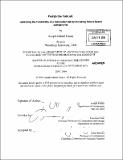Prefab the FabLab : rethinking the habitability of a fabrication lab by including fixture-based components
Author(s)
Nunez, Joseph Gabriel
DownloadFull printable version (8.394Mb)
Alternative title
Rethinking the habitability of a fabrication lab by including fixture-based components
Other Contributors
Massachusetts Institute of Technology. Dept. of Architecture.
Advisor
Lawrence Sass.
Terms of use
Metadata
Show full item recordAbstract
This thesis is about defining a fixture-based system that can be adapted into a digital fabrication production system of friction fit assembly. It is inspired by the work and research conducted by the Digital Design Fabrication Group at MIT, specifically the work related to the Cabin House and the Instant House. The building industry in recent decades has experienced a fluctuation of different delivery methods; within that variation has been prefabricated construction. Numerous examples, academic and professional, have demonstrated the benefits of prefabrication construction and as result this delivery method has gradually become more attractive to those considering alternative building types. I am interested in proposing a fixture-based system that would assist in electrical components, storage, and lightings and openings in order to improve the usability and flexibility of FabLab that is deployed as friction fit build. Modular systems of architecture have to a large extent remained in the combination of mono-material assemblies; therefore, this thesis asks the question, can mono-material assemblies be flexible enough to include other kinds of fixtures that support the addition of such amenities as electrical appliances, lighting, storage, and expandability?
Description
Thesis (S.M.)--Massachusetts Institute of Technology, Dept. of Architecture, 2010. Includes bibliographical references (p. 60-62).
Date issued
2010Department
Massachusetts Institute of Technology. Department of ArchitecturePublisher
Massachusetts Institute of Technology
Keywords
Architecture.